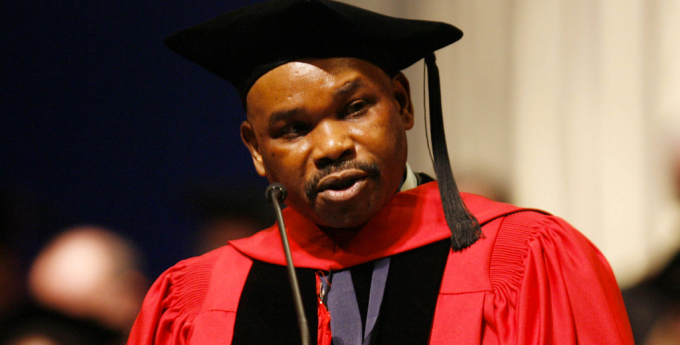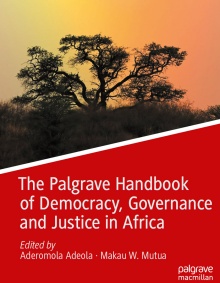
Exploring the next steps in African democracy
SUNY Distinguished Professor Makau M. Mutua’s new book covers a wide range of topics about the vast continent of Africa.
The Palgrave Handbook of Democracy, Governance and Justice in Africa (Palgrave Macmillan), which Mutua co-edited with democracy and human rights expert Aderomola Adeola, takes on the variety of experiences that African nations emerging from the colonial era have had with the democratic process and self-governance.
What emerges is a picture of nations that have made varying degrees of progress toward free and fair elections, but that continue to wrestle with issues such as full participation in political life, traditions that resist change, and failures of legal structures to address these and other deficits.
“While more countries are holding regular elections,” the editors write in their introduction, “the governance landscape on a whole is less democratic. Another way of putting this is that in principle, democracy is a popular ideal shared by a vast majority and reflected in the opening lines of constitution as grundnorm (the basic norm or rule that underpins a legal system).”

In chapters addressing case studies from Kenya to Cameroon, Côte d’Ivoire to Rwanda, and issues including climate refugees, the well-being of children in criminal proceedings, ensuring human rights and addressing past genocide, the volume is an ambitious take on the legal framework of a multifarious continent.
Mutua is a Margaret W. Wong Professor and a former dean of UB School of Law. Known internationally as an expert on Kenyan governance, a conversation with Mutua goes deeper into the book’s ambitions and findings.
Most of the contributors to this volume are based in Africa, and they come from government, NGOs and academia. How does this diversity of viewpoints help in rethinking structures of governance?
The project of recovering societies with a long and deep history of trauma is very complicated. As such, one needs to engage intellectuals, policymakers, civil society and the state to excavate what ails society and think through how to fix it. That’s why the book’s contributors are inclusive of all key actors.
You write that post-colonial African countries had high hopes for democratic self-governance but, despite regular elections, many have fallen short of that ideal. Is this simply the growing pains of new democracies, or is there an overarching challenge like corruption that works against well-functioning democracies?
Democracy is an experiment. No single country on the planet has fully realized this experiment. Of course, some are more successful than others, or more practiced in implementing the norms and rhythms of liberalism. In Africa, the liberal idea as known in the West is relatively new. That, and the legacies of historical ravages such as enslavement, colonialism, the Cold War, and post-mal-governance such as corruption and elite moral bankruptcy, have made it very difficult to create more prosperous societies.
An emerging challenge is the full participation of young people and women in African democracies. Are old customs and traditions impeding that participation?
Young people the world over don’t really participate in large numbers in politics, especially elections. They have many distractions and issues. The problem has been getting more women into the political process. It’s not because of “tradition.” It’s because of gender biases, roles and the domination of the political space by men.
The theme of human rights—ensuring rights in the future and coming to terms with the abuses of the past—runs through the book. To what extent do international or pan-African entities come into play in this important work?
Transitional justice, by which I mean excavating abuses of the past to prevent their recurrence, is an important part of the restoration of societies to political and social health. International human rights organizations, including at the UN level, realize that societies that simply bury the past can’t heal. While an imperfect tool, transitional justice is recognized by the African Union and other regional bodies as important in the toolbox of recovery.
The book includes chapters on term limits, election technology and the media’s role in the political landscape—all issues that hit close to home. Do any of your authors make arguments that can inform the practice of democracy in the United States?
Younger states/emerging democracies have a lot to teach richer and older democracies like the U.S. Trump’s attempt to overthrow the U.S. after he lost the 2020 election is a case in point. The book argues that we must continue to teach ourselves about the pitfalls and strengths of democracy so that we can avoid oppression. It’s a universal problem that requires universal solutions.